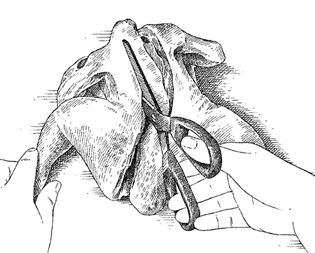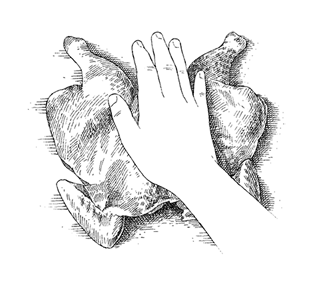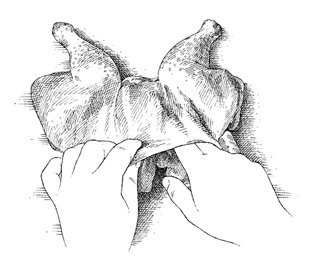The Cook's Illustrated Cookbook (157 page)
Read The Cook's Illustrated Cookbook Online
Authors: The Editors at America's Test Kitchen
Tags: #Cooking

![]() WHY THIS RECIPE WORKS
WHY THIS RECIPE WORKS
The technique of high-roasting a chicken (cooking it at temperatures in excess of 450 degrees) promises crisp, golden skin and a short cooking time—but also dry meat and billows of smoke. To ensure the chicken stayed moist, we butterflied it—this allowed the thighs greater exposure to the heat so that they would cook at about the same rate as the delicate breast meat. Since 500 degrees was the optimal temperature for the crisp, browned skin we were looking for, we needed to find a solution to the smoking problem. We found our answer in potatoes—placing them in a broiler pan with a slotted top protected them from the high heat of the oven, and they absorbed the dripping fat (and flavor) of the chicken, preventing smoke and making for a flavorful side dish all at once.
See “BUTTERFLYING A CHICKEN OR TURKEY” illustrations that follow recipe.
SERVES 3 TO 4
If using kosher chicken, do not brine in step 1, and season with salt as well as pepper in step 3. Because you’ll be cooking the chicken under high heat, it’s important that you rinse it thoroughly before proceeding—otherwise, the sugar remaining on the skin from the brine will caramelize and ultimately burn. For this cooking technique, russet potatoes offer the best potato flavor, but Yukon Golds develop a beautiful color and retain their shape better after cooking. Either works well in this recipe. A food processor makes quick and easy work of slicing the potatoes.
1 | (3¹⁄ |
Salt and pepper | |
¹⁄ | cup sugar |
2¹⁄ | pounds russet or Yukon Gold potatoes, peeled and sliced ¹⁄ |
2 | tablespoons olive oil |
2 | tablespoons unsalted butter or |
1.
Using kitchen shears, cut along both sides of backbone to remove it. Flatten breastbone and tuck wings behind back. Dissolve ¹⁄
2
cup salt and sugar in 2 quarts cold water in large container. Submerge chicken in brine, cover, and refrigerate for 1 hour.
2.
Adjust oven rack to lower-middle position and heat oven to 500 degrees. Line broiler-pan bottom with aluminum foil. Toss potatoes with 1 tablespoon oil, ¹⁄
2
teaspoon salt, and ¹⁄
4
teaspoon pepper in bowl. Spread potatoes in even layer in prepared broiler-pan bottom and cover with broiler-pan top.
3.
Remove chicken from brine, rinse thoroughly, and pat dry with paper towels. Using your fingers, gently loosen center portion of skin covering breast and thighs. Place butter under skin, directly on meat in center of each side of breast and on thighs. Gently press on skin to distribute butter over meat. Rub skin with remaining 1 tablespoon oil and season with pepper. Place chicken on broiler-pan top and push each leg up to rest between thigh and breast.
4.
Roast chicken until skin has crisped and turned deep brown, breast registers 160 degrees, and thighs register 175 degrees, 40 to 45 minutes, rotating pan halfway through roasting. Transfer chicken to carving board and let rest for 10 minutes.
5.
While chicken rests, remove broiler-pan top and, using paper towels, soak up excess grease from potatoes. Transfer potatoes to serving platter. Carve chicken, transfer to platter with potatoes, and serve.
MAKES ABOUT 3 TABLESPOONS
2 | tablespoons unsalted butter, softened |
2 | teaspoons minced canned chipotle chile in adobo sauce |
1 | garlic clove, minced |
1 | teaspoon honey |
1 | teaspoon grated lime zest |
Mash all ingredients together in bowl.
MAKES ABOUT 3 TABLESPOONS
2 | tablespoons unsalted butter, softened |
1 | tablespoon Dijon mustard |
1 | teaspoon minced fresh thyme |
1 | garlic clove, minced |
¹⁄ | teaspoon pepper |
Mash all ingredients together in bowl.

1.
Using kitchen shears, cut along both sides of backbone to remove it.

2.
Flip bird over, use heels of your hands to flatten breast bone, and tuck wings underneath.

3.
Using your fingers, gently loosen center portion of skin covering each side of breast (and thighs if necessary).
![]() WHY THIS RECIPE WORKS
WHY THIS RECIPE WORKS
The basic method for poulet en cocotte, or French chicken in a pot, is simple: Place a seasoned chicken in a pot, scatter in some vegetables, cover, and bake. When done right, this dish forgoes crisp skin for unbelievably tender, succulent meat and rich, concentrated flavor. The key is a dry cooking environment; unlike braising, little to no liquid is added. Our main challenge was to prevent the humidity in the pot from diluting the flavor of the meat as it cooked. By removing the chunks of vegetables we had been adding—the liquid they released made the pot too steamy—and cooking the chicken by itself in a tightly sealed pot, we got the rich, concentrated flavor we sought. Cooking the bird at a low 250 degrees ensured the breast meat didn’t dry out. Finally, we found that we could add a small amount of potently flavored aromatics if they were lightly browned with the chicken to remove most of their moisture.
SERVES 4
You will need at least a 6-quart Dutch oven with a tight-fitting lid for this recipe. If you choose not to serve the skin with the chicken, simply remove it before carving. The amount of jus will vary depending on the size of the chicken; season it with about ¹⁄
4
teaspoon lemon juice for every ¹⁄
4
cup.
1 | (4¹⁄ |
Salt and pepper | |
1 | tablespoon olive oil |
1 | small onion, chopped medium |
1 | small celery rib, chopped medium |
6 | garlic cloves, peeled |
1 | bay leaf |
1 | sprig fresh rosemary (optional) |
¹⁄ | teaspoon lemon juice |
1.
Adjust oven rack to lowest position and heat oven to 250 degrees. Pat chicken dry with paper towels, tuck wings behind back, and season with salt and pepper. Heat oil in Dutch oven over medium heat until just smoking. Add chicken breast side down; scatter onion, celery, garlic, bay leaf, and rosemary sprig, if using, around chicken. Cook until breast is lightly browned, about 5 minutes. Using wooden spoon inserted into cavity of bird, flip chicken breast side up and cook until chicken and vegetables are well browned, 6 to 8 minutes.
2.
Off heat, place large sheet of aluminum foil over pot and cover tightly with lid. Transfer pot to oven and cook chicken until breast registers 160 degrees and thighs register 175 degrees, 1 hour 20 minutes to 1 hour 50 minutes.
3.
Transfer chicken to carving board, tent with foil, and let rest for 20 minutes. Meanwhile, strain chicken juices from pot through fine-mesh strainer into fat separator, pressing on solids to extract liquid; discard solids. Let juices settle for 5 minutes, then pour into saucepan and set over low heat. Carve chicken, adding any accumulated juices to saucepan. Season with lemon juice, salt, and pepper to taste. Serve chicken, passing sauce separately.
![]() WHY THIS RECIPE WORKS
WHY THIS RECIPE WORKS
Chicken and rice is a dish with obvious appeal: It’s a one-dish supper, it’s easy, and it’s eminently variable. The solution to overcooked breast meat was simple; we just added it to the pot about 15 minutes after the legs went in. Avoiding heavy, greasy rice was a little more challenging. We finally found the answer in reducing the amount of liquid (a combination of white wine, water, chopped canned tomatoes, and tomato liquid) that we added to the rice. Decreasing the amount of liquid helped, as long as we stirred the rice once to prevent the top layer from drying out. Although we tried (and liked) several varieties of rice, we settled on basic long-grain rice for this all-purpose dish.